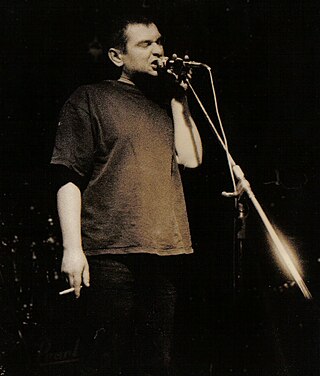
Kraków, also spelled as Cracow or Krakow, is the second-largest and one of the oldest cities in Poland. Situated on the Vistula River in Lesser Poland Voivodeship, the city dates back to the seventh century. Kraków was the official capital of Poland until 1596, and has traditionally been one of the leading centres of Polish academic, economic, cultural, and artistic life. Cited as one of Europe's most beautiful cities, its Old Town with Wawel Royal Castle was declared a UNESCO World Heritage Site in 1978, one of the world's first sites granted the status.

Jerzy Pilch was a Polish writer, columnist, and journalist. Critics have compared Pilch's style to Witold Gombrowicz, Milan Kundera, or Bohumil Hrabal.

Marcin Świetlicki is a Polish poet, writer, and musician. He lives and works in Kraków, Poland.
Jerzy Hordyński was a Polish poet and writer.
Liberature is literature in which the material form is considered an important part of the whole and essential to understanding the work.

Renata Kijowska is a Polish journalist and reporter of The Facts, the flagship newscast of TVN, one of Poland's major television networks.

Adam Dawid Szostkiewicz is a Polish author, commentator on religion and politics, journalist and translator.

Jan Marek Hartman is a Polish of Jewish descent philosopher specializing in bioethics, writer, anticlerical, opinion journalist and politician, professor of the humanities.

The Conrad Festival is an annual literary festival held in Kraków since 2009. It is organised by the Tygodnik Powszechny Foundation and the Kraków Festival Office and is supported by the Kraków Municipal Government and Poland's Ministry of Culture and National Heritage. It is the largest literary festival in Central Europe and was named after Polish-British novelist Joseph Conrad.
Magdalena Smoczyńska, born 25 April 1947 in Kraków, is a Polish psycholinguist and expert in the development of language in children. She is an emeritus reader in the department of linguistics at Jagiellonian University where she was once head of the Child Language Laboratory and now studies specific language impairment (SLI) at the Institute for Educational Research.
Magdalena Heydel, known also as Magda Heydel, is a Polish philologist and translator.

Copernicus Festival is a science festival held every May in Kraków, Poland. It was founded in 2014 and provides lectures, discussions, workshops, film screenings and exhibitions focusing on neuroscience, evolutionary biology, physics, law, and philosophy at various venues in the city. The event is organized by the Copernicus Center and the Tygodnik Powszechny Foundation.
Katarzyna Julia Sanak-Kosmowska is a Polish marketing and public relations theorist and researcher, assistant professor at the Marketing Department at the Kraków University of Economics.

Józefa Maria Hennelowa was a Polish publicist, journalist, columnist, Catholic intellectual, and politician. As a journalist, she spent more than seven decades as a reporter and editor at Tygodnik Powszechny, a Catholic weekly newspaper headquartered in Kraków. Hennelowa also served in the Sejm, the lower house of the Parliament of Poland, from 1989 until 1993 during the country's transition from communism to democracy.

Katarzyna Tubylewicz is a Polish writer, translator, and a journalist based in Stockholm, Sweden.
Tomasz Sapota is a Polish classical philologist, Latinist and literary scholar, professor at the University of Silesia in Katowice, in 2016–2019 vice-dean for student affairs and education at the Faculty of Philology of the University of Silesia.
Barbara Rozalia Terakowska (1938–2004), known as Dorota Terakowska, was a Polish writer and journalist best known for her fantasy books for children and young adults, two of which became required reading at Polish schools. Her novel Córka czarownic was included in the IBBY Honour List and received the Polish IBBY section literary award; it also became her most translated work. Before focusing on literature in 1980s, Terakowska wrote for various newspapers and magazines such as Gazeta Krakowska and Przekrój.

Urszula Chowaniec, also Ula Chowaniec was born 17 May, 1976 in Oświęcim. She is a Polish literary scholar, literary critic, and professor of humanities.
Ewa Sonnenberg is a Polish poet, pianist, essayist and academic who has won several awards for her work. A lesbian, she is best known for her volume entitled Hazard.

Zośka Papużanka is a Polish writer, songwriter, and primary school teacher.












